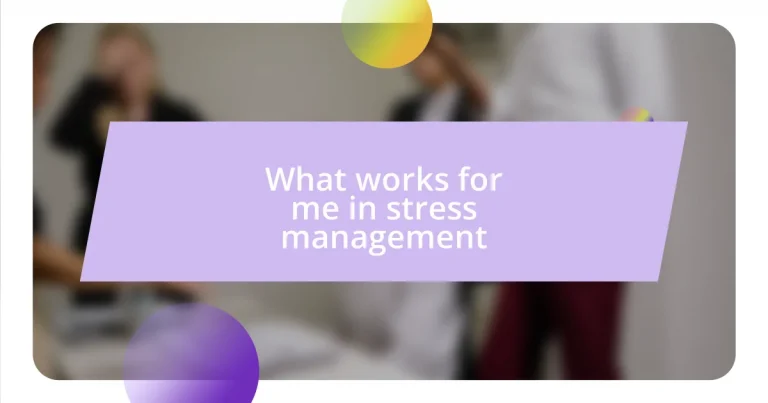Key takeaways:
- Stress affects both personal well-being and relationships, highlighting the need for early recognition and management strategies.
- Mindfulness techniques, such as deep breathing and gratitude journaling, are effective tools for reducing stress and enhancing self-awareness.
- Building a support network, including friends, coworkers, and community connections, is essential for alleviating stress and sharing experiences.
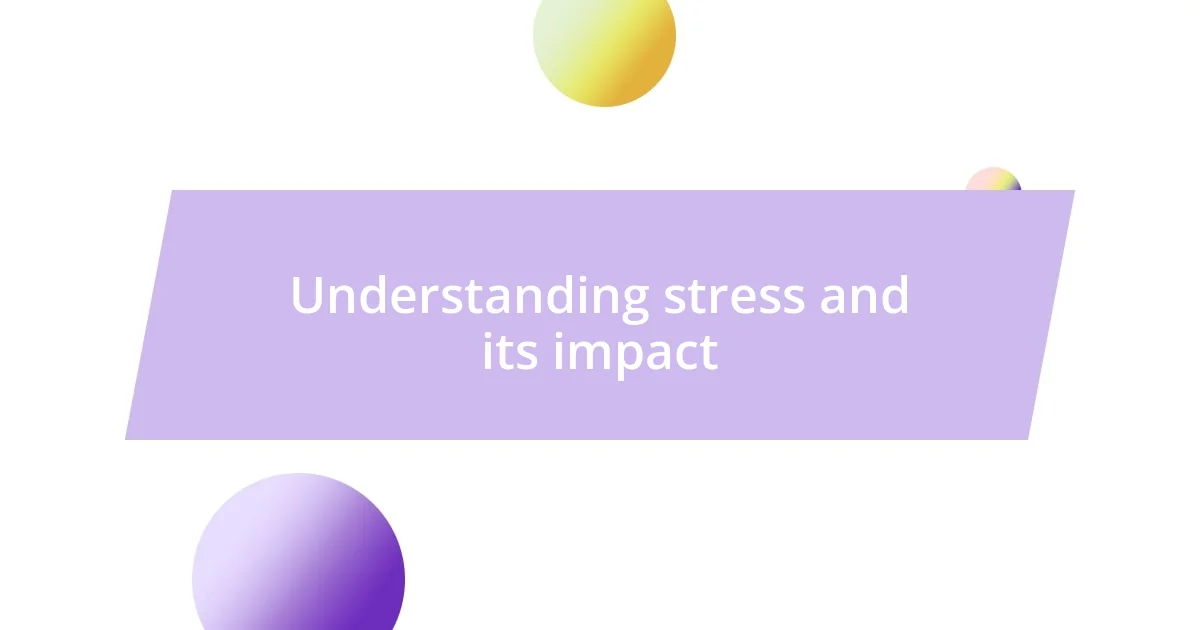
Understanding stress and its impact
Stress is a reaction to the demands placed on us, whether they’re physical, emotional, or mental. I remember a time when I felt overwhelmed by deadlines at work, and that constant pressure not only affected my productivity but also seeped into my personal life, causing strain in relationships. Isn’t it interesting how stress can ripple out, affecting not just our well-being but also those around us?
The impact of stress can manifest in various ways, from difficulty concentrating to physical symptoms like headaches or fatigue. Honestly, there were days when I found myself irritable over the smallest things, which made me question: How much of my mood was really driven by stress? This realization hit home for me, highlighting the importance of recognizing stress signals early.
As I delved deeper into understanding my own stress, I recognized how it could alter my perspective on daily challenges. I started to ask myself why certain situations overwhelmed me while others didn’t, exploring the emotional roots of my stress. This journey has shown me that managing stress is as much about self-awareness as it is about finding effective coping strategies.
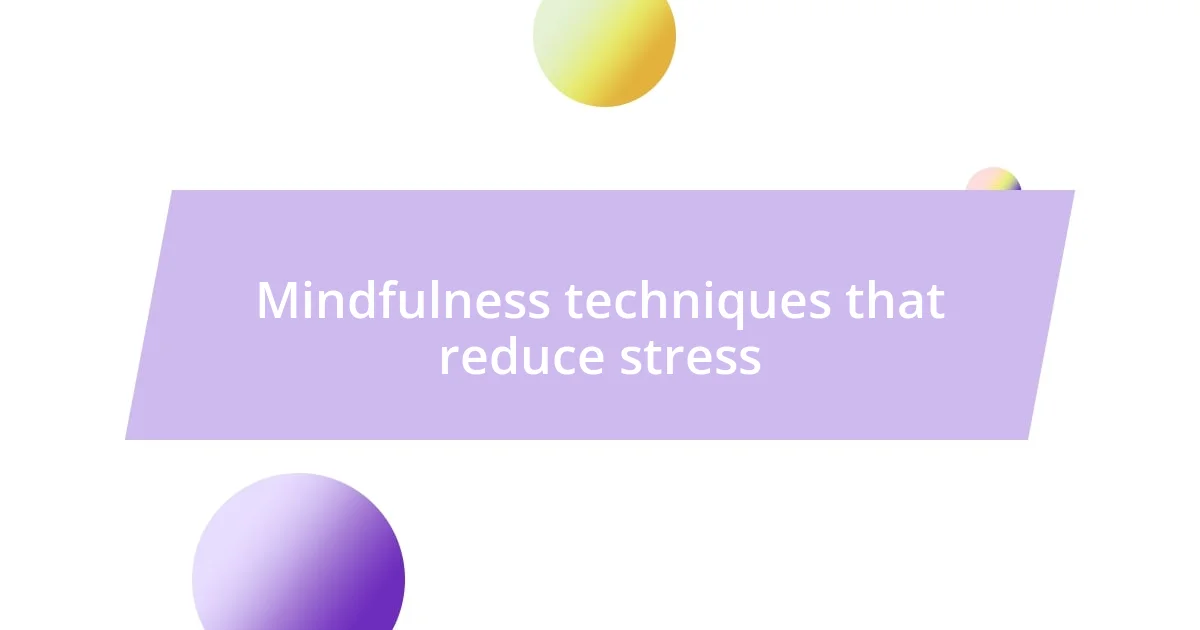
Mindfulness techniques that reduce stress
Mindfulness techniques can be incredibly effective in reducing stress, helping us to reconnect with the present moment. I recall a particularly hectic period when I discovered deep breathing exercises. These simple practices allowed me to shift my focus from the chaos of the day to my natural breath, grounding me in the here and now. I remember one afternoon, feeling the tension melt away as I centered myself, reminding me of just how powerful our breath can be in calming the mind.
To harness the benefits of mindfulness in your daily routine, consider these techniques:
- Deep Breathing: Inhale slowly through your nose, hold for a moment, and exhale through your mouth to release tension.
- Body Scan: Lie comfortably and mentally scan your body for areas of stress, acknowledging them without judgment.
- Mindful Walking: Take a quiet walk, focusing on the sensation of your feet touching the ground, the sounds around you, and the rhythm of your breath.
- Gratitude Journaling: Spend a few minutes each day writing down things you are grateful for, shifting your focus away from stressors.
- Meditation: Set aside time for a guided meditation, even if just for a few minutes, to cultivate a calm mind.
Integrating mindfulness into my life has been a journey of discovery. There were days when I struggled to sit still, yet I found solace in movement. Even on those days, practicing mindfulness made the world feel a little less overwhelming and opened my eyes to life’s small joys. Each technique offers a unique opportunity to step back from stress, understand it, and respond more effectively.
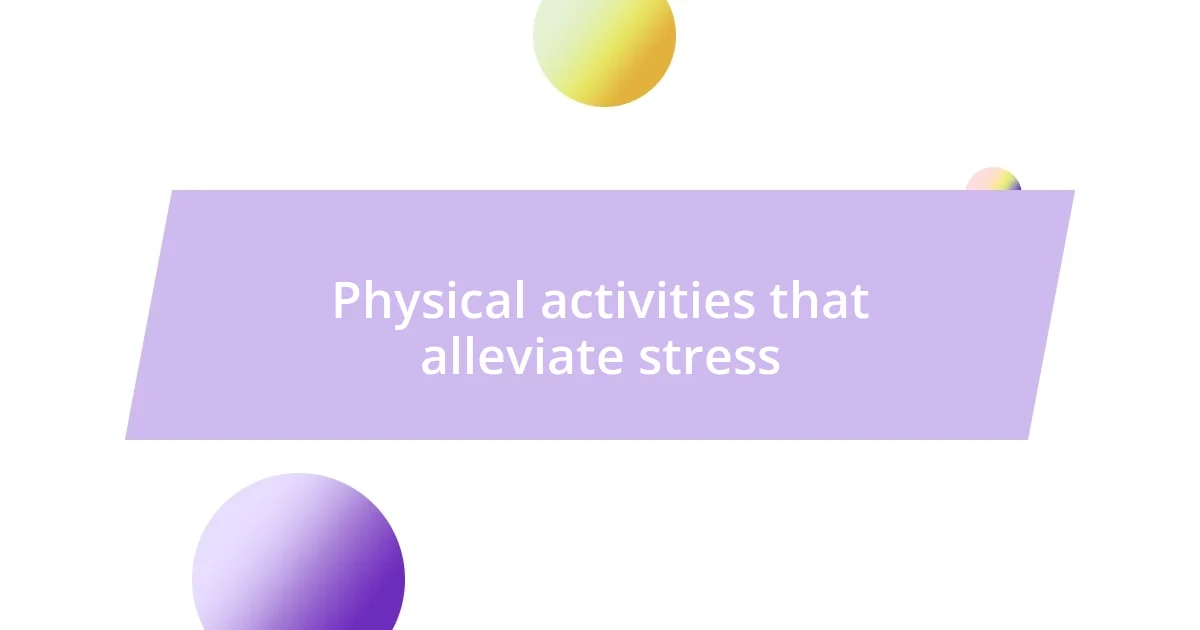
Physical activities that alleviate stress
Engaging in physical activities can serve as a powerful antidote to stress. I often find that when I’m feeling anxious, a brisk walk or a quick jog does wonders. One particularly stressful week, I laced up my sneakers and hit the trail. The rhythmic sound of my footsteps provided a soothing soundtrack to my racing thoughts, making me feel lighter and more in control.
Whether it’s dancing, swimming, or even practicing yoga, the benefits are profound. I remember a time when I attended a Zumba class on a whim. The upbeat music and infectious energy of the group lifted my mood almost immediately. Nothing beats that exhilarating feeling post-exercise, where endorphins start flowing and worries seem trivial.
Consistency is key to making physical activities part of your stress management routine. I’ve realized that setting small, achievable goals helps keep me motivated. Whether it’s committing to a 30-minute workout a few times a week or simply going for a walk during lunch breaks, these activities have truly transformed how I handle stress. Participating regularly not only elevates my mood but also fosters a healthier lifestyle.
| Activity | Benefits |
|---|---|
| Walking | Enhances mood, reduces anxiety |
| Dancing | Boosts endorphins, encourages self-expression |
| Yoga | Improves flexibility, promotes relaxation |
| Running | Increases stamina, alleviates stress |
| Swimming | Reduces tension, provides a full-body workout |
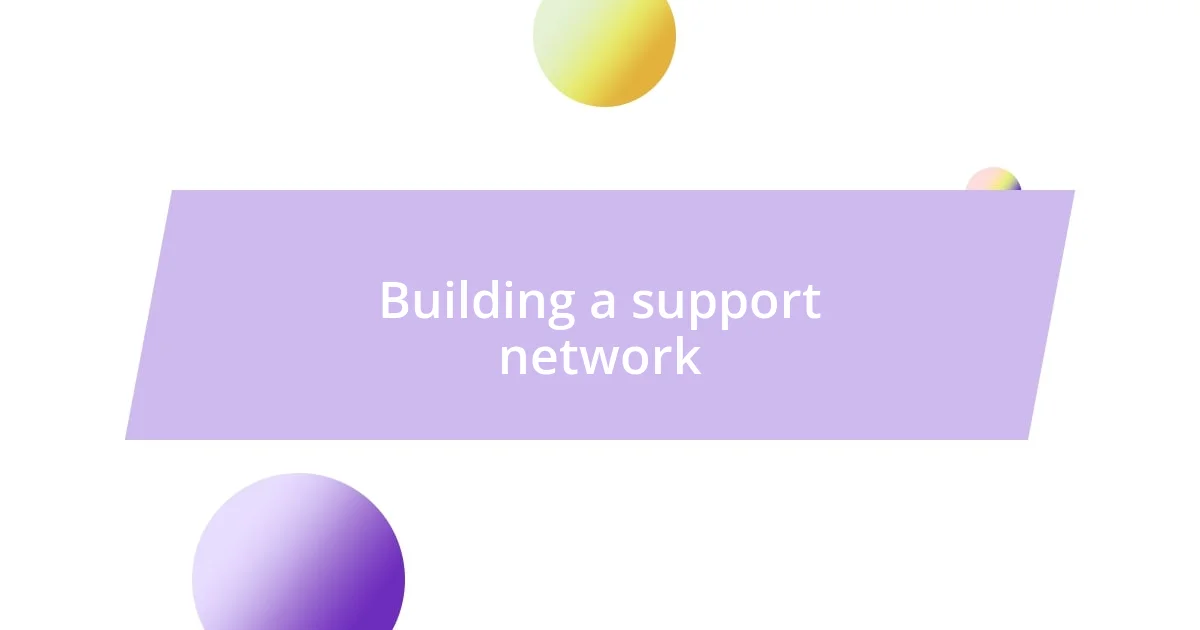
Building a support network
Building a support network is essential for managing stress effectively. I remember feeling overwhelmed during a demanding project at work. During that time, I reached out to a close friend. Simply sharing my thoughts and frustrations made a world of difference. It’s amazing how just having someone listen can lighten the load, isn’t it?
When I think about support networks, I often reflect on how diverse they can be. It’s not just about family or friends; sometimes, my coworkers have been my greatest allies. I recall joining a small group of colleagues who were also experiencing the pressures of deadlines. We started meeting weekly for coffee, allowing us to vent and share advice. That sense of camaraderie transformed our work experience. I genuinely felt that we were all in it together.
Have you ever considered the role that community can play in your mental well-being? Whether it’s joining a local club, participating in group activities, or connecting with online forums, building a support network offers incredible relief. There’s comfort in knowing I’m not alone in my struggles. Ultimately, fostering these relationships can be one of the most effective strategies for stress management, and I can’t emphasize enough how transformative it has been for me.












